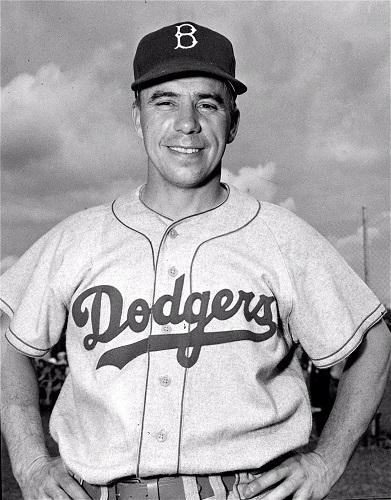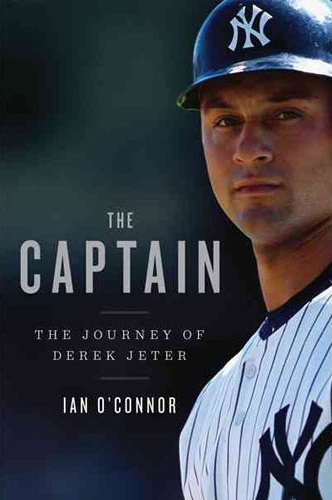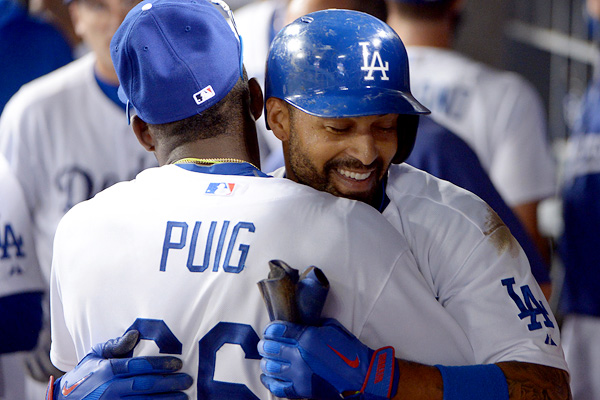Yesterday, on one website, I came across the following question: “Who is the Dodger captain?” The question was answered with only a suggestion that it could be Matt Kemp or Andre Ethier. I expect for many Dodger fans the question brought back memories of – “The Captain” – Pee Wee Reese.
“Harold Pee Wee Reese was a captain of captains,” wrote Carl Erskine, a teammate of Reese for ten years. “Our infield was full of captains – Roy Campanella was like a field general; Gil Hodges, a sharp thinker with baseball savvy; Jackie Robinson, smart, aggressive. Any of them could have been a captain. Pee Wee, however was the respected leader. He played for at least four different type managers all of whom considered him their extension on the field.”

Hall of Famer Pee Wee Reese is perhaps the best known captain in Dodger history. Why hasn’t there been a Dodger captain in over 30 years?
(AP photo)
I also expect most Dodger fans realize there is no Dodger captain and there has not been one for quite some time. I was fully aware of the captaincy vacancy with the Dodgers but I was amazed to learn that there have been only five official captains in Dodger history, most of them with a brief tenure – Pee Wee Reese (1949-1958), Duke Snider (1962), Maury Wills (1963-66), Willie Davis (1973), Davey Lopes (1978-79). I was even more amazed to find that only three teams presently have captains – Derek Jeter of the New York Yankees, David Wright of the New York Mets and Paul Konerko of the Chicago White Sox. Jason Varitek was not replaced as the Red Sox captain upon his retirement in 2011.

Derek Jeter has been the official captain of the Yankees since 2003. In fact, a book entitled The Captain: The Journey of Derek Jeter was published in 2011 about the Yankee shortstop and future Hall of Famer. (Image courtesy of
Houghton Mifflin Harcourt)
National Football League teams have captains as do National Hockey League teams, as well as National Basketball League teams. Why have professional baseball teams given up the position of “captain”? I would guess that as the game has evolved the position does not have the significance it did when Pee Wee Reese was captain or has simply become redundant with managers coming onto the field so often during the course of games. Perhaps the role of team captain is now seen as a distraction for a player working at the most difficult game to play in all of sports. It may also be noted that the captains in the other team sports mentioned above serve official functions which are designated by the league or team. Baseball captains have not and do not serve specific functions although some could be assigned duties such as presenting lineup cards at the beginning of the game.
What is the role of the baseball captain? According to Paul Konerko there is one specific duty that a captain can perform while he is on the field. A team captain can ask the umpire about the interpretation of a rule. For instance, a ruling on an an infield fly. If the umpire has used the wrong interpretation, the captain has the right to ask the umpire to consult with the other umpires on the field. The captain also has the right to ask the umpire if he was in the proper position to make the call. The team captain does not have the right to argue or verbally abuse the umpire, but he does have the right to ask questions. It seems to me that is a non-confrontational way to question a ruling on the field without shouting, screaming and kicking dirt.
Beyond asking about rule interpretations, a baseball captain plays a more subtle role on a team. He in essence becomes the face of the team on and off of the field. He may well not be the best player with the highest batting average or most home runs but the one who best represents the team. Although I am not one to applaud unwritten rules, there may be some unwritten ones for the captain, a set of expectations so to speak. A captain, a highly respected player on the team, may serve as an intermediary for the manager in dealing with player personnel issues. That is, he can help avoid a manager-player confrontation with a quiet conversation with a teammate or even help avoid the necessity of a full team meeting with the manager.
Every team has a heart beat, a pulse that makes it a living entity and different from every other team. A captain takes the blood pressure of the team, checks the pulse rates, and observes what his teammates are thinking and feeling. The team captain definitely has to understand what his teammates are thinking and feeling and even have some understanding of why they think and feel as they do. He then becomes a representative for his teammates taking their concerns to the coaching staff or manager when the players are unwilling or unable to do do themselves. As with all difficulties early intervention is something a captain can provide to help avoid more serious issues.
Perhaps one of the greatest roles a team captain can play is to help young players – rookies – to adjust to major league baseball and especially to the team. It may be as simple as how to dress for a road game or as complicated as how to deal with the inevitable failure that baseball inflicts on all players, especially those that are young. Perhaps part of his role may be to help young players understand the unwritten rules of the game and the etiquette that infiltrates the game on the field.

Many consider Matt Kemp the unofficial captain of the Dodgers. Who would you pick as the official Dodger captain if such a position existed today?
(Photo credit – Kirby Lee)
A baseball captain has to be a role model for his team. It would be difficult to argue that Derek Jeter, David Wright and Paul Konerko are not good role models for their teams and for baseball in general. Who on the present Dodger roster, in your opinion, would best suit the role of “Dodger Captain” following the examples set by Pee Wee Reese, Duke Snider, Maury Wills, Willie Davis and Davey Lopes. I have my choice firmly in mind and would like to introduce him in a future article.




 July 12th, 2013 at 8:22 am
July 12th, 2013 at 8:22 am  by Harold Uhlman
by Harold Uhlman  Posted in
Posted in 

Excellent article, Harold.
If I had to venture a guess as to why there hasn’t been a Dodger captain since 1979 I would say that it is because of free agency.
Because of free agency, very few players in today’s game remain with one team long enough to establish themselves as a team leader. Additionally, with today’s insane multi-million dollar contracts (a direct result of free agency), how on earth could a guy making substantially less than guys like Kemp, Greinke, Gonzalez, Crawford, Ramirez, (etc., etc.) be in a position to tell these guys what to do or how to act?
Free agency aside, my pick for the Dodger captain would be Clayton Kershaw, with A.J. Ellis as the runner-up.
The death of Dodger captains pretty much follows free agency. A good observation. It is interesting that Davey Lopes was with the Dodgers through 1981 but is listed as captain only in 1978 and 1979.
I don’t believe that a huge contract automatically would rule out a player from being a captain. His personality and style of play would compensate for that and make him approachable. eg. Derek Jeter, Paul Konerko. At the same time a great team player regardless of his salary would have the respect of the other players in my opinion. He leads by example. The movement from team to team would definitely be a deterrent to being captains.
The evolution of the games has changed on field procedures a lot. At one time playing managers were common, then captains to perform the duties of playing managers. In time managers and coaches took over the duties of the captain so the job became somewhat redundant. It eventually became more of an honorary position.
In other team sports head coaches aren’t permitted on the playing area (hockey arena, basketball court, football field). There is a bit of leeway in Football and basketball but anything serious results in a penalty to the team or removal from the game. Managers in baseball are frequently on the field so a captain is not necessary to ask questions of umpires. Nonetheless I see a role for a team captain in baseball.
If I had to pick a caption for the Dodgers my choice would be A.J Ellis. I think he has enough experience as a major league player. Although you might argue that the pitchers are enough for him to handle, I think he’s the type of guy that can make a good captain.
[…] its storied 151-year history, the Dodgers have had several “official” team captains, albeit very few. And while it is generally accepted that 10-time All-Star and Hall of Fame […]